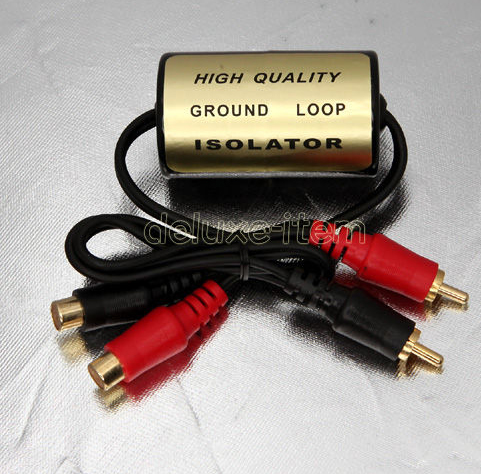

By doing this quick fix, you're saying you entrust your own safety, the safety of your church members, and the safety of the building (read: risk of fire) to your knowledge of electronics. This is not your average 9V battery project.īased on what you've said, you probably sound like a novice.
#HUM X GROUND ISOLATOR CODE#
Do you want to know what happens in the event of an electrical surge? These are just some of the few reasons why stringent certification institutions/laws such as UL and the National Fire Code were setup in the first place.Įither get a true isolation transformer or, if you're feeling adventurous, buy the HumX.Ī little bit of extra money now can go a long way in terms of safety down the road. Do you want to know what happens when one of those go loose inside that junction box? And frankly, this is just my paranoia, but I don't trust one layer of thin heat shrink to hold up 100-200 volts in between.

See that little exposed section of wire? Do you want to know what happens when that touches the side of the metal junction box? Your solder joints look like cold solder joints.they won't hold up. In that situation, those diodes will vaporize before anything is protected, and DUNGDUNGDUNG you've got a dangerous situation where your device is NOT GROUNDED AT ALL.Īs for your attempt to replicate the humX in your last picture: I'm guessing you placed what you made in the first 2 pics into that junction box with the outlet. That said, in the case of a short, I don't see two 6A-rated diodes withstanding currents in a short circuit. Remember, the purpose of a ground is so unintentional live electricity goes back to the neutral in the breaker box (and hopefully tripping the breaker) instead of going through YOU. In situations where there is no ground loop to begin with, the two diodes stay open-circuit as if the two grounds were never connected.įrankly, I would not want to use this device because the ground reliability is severely compromised. In a ground loop event, the two parallel diodes will certainly conduct and you have a (sort of) ground-loop-free situation. This device works by conducting ground when a certain threshold is reached between the grounds. Or "sound going across the AC line" in relation to its theory of operation (you probably have some terminology mixed up). Regarding hum x and reading this:, this has nothing to do with "shorts" Topics 1 and 2 have barely anything to do with each other. There are two topics at hand from what I'm reading: 1) ground loop noise causing hum, and 2) a diode clipper circuit to do something. What you're saying makes almost no sense at all. But I have a couple of questions for those of you who are more knowledgeable or experienced than I.ġ.) Is this totally safe? I dont want to have any question in my mind when I plug a $7000 board into it.Ģ.) What is the purpose of the resistor in this circuit? I built my own, and think it turned out pretty well. It's simply a 1k resistor going into two diodes oriented in opposite directions, then wired to the receptacle. The idea is that the diodes are biased at 0.7v, thus allowing any dangerous voltages, like a short, to be dissipated through ground, but wont conduct the low voltage sound. After some google-fu, I never found out exactly whats in the Hum X, but I found a couple places where people built this device with good results. I figured it was probably a fairly simple circuit, and wanted to try to figure it out before we spent that kind of money.

The other guy that operates the media booth with me wanted to buy a few of these for our media PCs and the board. Well, we've been having some ground loop issues with our audio at church. Im sure at least a couple of you are familiar with the hum x, used for eliminating ground loop noise.


 0 kommentar(er)
0 kommentar(er)
